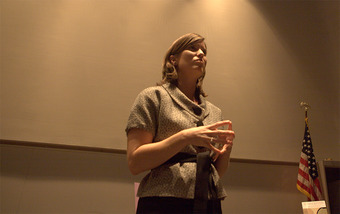The Raoul Wallenberg Memorial LecturePeace Studies

In 1982, Gustavus Adolphus College awarded Raoul Wallenberg an honorary degree in absentia which was accepted on his behalf by his sister Nina. In 1983, Gustavus established an annual lecture to commemorate the heroic service of Raoul Wallenberg in his fearless support of persecuted Jews during the Second World War. Past speakers have included South African poet Dennis Brutus, Swedish diplomat Per Anger, Bishop Medardo Gomez, Lutheran Archbishop of San Salvador, and Sir Brian Urquhart, former Undersecretary General of the Nations for Special Affairs.
| Year | Speaker | Affiliation/Notes |
|---|---|---|
| 2012 | Ingemar Eliasson | Former Swedish politician, economist, and governor on “Wallenberg” |
| 2011 | Dr. Jennifer McBride | “Bonhoeffer and Repentance: A Constructive Proposal for Christian Public Witness” Prof. of Religion, Wartburg |
| 2010 | Dr. Jo Ellen Fair | “Not a Simple Story: Mass Media and Mass Violence, The African Case”, Prof. of Journalism, U. of Wisconsin, Madison |
| 2009 | Dr. Steven Miles | Prof., U of Minnesota Medical School, “Oath Betrayed: America’s Torture Doctors” |
| 2008 | Mark Hanis | Founder of the Genocide Intervention Network, “Never Again is Again in Darfur: Taking a Stand Against Genocide” |
| 2007 | Ben Olander | Swedish Folksinger performing songs inspired by Raoul Wallenberg |
| 2006 | Dr. Hugh Parmer | President, American Refugee Committee, “Humanitarian Crisis in Darfur: Perspectives from the Field” |
| 2005 | Dr. Peter Wallensteen | Swedish Peace Researcher, “Dag Hammarskjöld: Diplomat, Peacemaker, and International Civil Servant” |
| 2004 | Diane Orentlicher | Prof. of Law at American U. , “Saddam on Trial” |
| 2003 | Douglas Johnson | Director, Center for Victims of Torture, “Human Rights Denied: Human Dignity Ignored” |
| 2002 | Lucille Eichengreen | Holocaust survivor |
| 2001 | Dr. Robert Jan Van Pelt | Prof. of Architecture, U of Waterloo; Expert on Death Camp architecture |
| 2000 | Dr. Paul Levine | Wallenberg Biographer; Uppsala Program for Holocaust Studies |
| 1999 | Dr. Harvey Rosenfeld | Wallenberg Biographer; Professor of History, Pace University, NY |
| 1998 | Fred Baron | Small businessman, Minneapolis; Survivor of Bergen-Belsen Camp |
| 1997 | Ninotchka Rosca | Novelist and human rights activist from the Philippines |
| 1996 | Dr. Robert Fisch | Pediatrician/Graphic Artist, MN; Hungarian Concentration Camp Survivor |
| 1995 | Harold Stassen | Former Governor of Minnesota; Signatory on USS Missouri, 1945 |
| 1994 | Marjorie Agosin | Chilean Poet and Human Rights Activist |
| 1993 | Dr. Steven Koblik | Scandinavia Historian; President, Reed College |
| 1992 | Sir Brian Urquhart | Former Undersecretary, UN |
| 1991 | Gen. Indar Rikhye | Former Head Peacekeeping, UN |
| 1990 | Herb Frey | Minister, Alliance of the Streets, MN |
| 1989 | Fr. Medardo Gomez | Lutheran Bishop of San Salvador |
| 1988 | Agnes Adachi | Volunteer Associate of Raoul Wallenberg |
| 1987 | Per Anger | Swedish Diplomat; Wallenberg’s Supervisor in Budapest |
| 1986 | Dennis Brutus | South African poet |
| 1985 | Jeri Laber | Executive Director of the United States Helsinki Watch |
| 1984 | Theo Kotze | South African church leader and critic of Apartheid |
| 1983 | Mulford Q. Sibley | Professor of Political Science, U. of Minnesota |
| 1982 | Stephen Spender | Essayist and Poet |
Background on Raoul Wallenberg
Raoul Wallenberg is one of the least known and the greatest of heroes of our century. In the dark days of World War II, when so many people worldwide were silent, willfully opaque or simply afraid to act, Wallenberg energetically took up the cause of thousands of Hungarian Jews in imminent danger of mass extermination. He used a combination of moral outrage, bribery, and bluff to stand down Adolf Eichmann and his underling Nazi murderers. Their goal was the systematic extermination of Hungary’s Jews as part of the larger Nazi “final solution” of the so-called “Jewish Problem.”
Raoul Wallenberg saved thousands of Jewish lives by issuing hastily prepared “protecting passports,” which instantly made the bearers Swedish citizens. He provided them accommodation, board, and medical care in houses the Swedish Embassy bought up as safe houses. On the ensuing death marches, which he had fought fiercely to prevent, he dispensed food and blankets wherever he could and shamed the guards into more humane behavior. His most dramatic intervention came at the point when plans were imminent to exterminate the entire remaining Jewish population of Hungary in the Budapest ghetto. Acting only on his own moral authority, Wallenberg sent a note to the German commander, promising to make sure he would be hanged as a war criminal if he went ahead with the destruction of the ghetto. The commander blinked and the lives of around 70,000 Jews were saved right there, since they were soon thereafter liberated by the advancing allied forces.
Without Raoul Wallenberg’s conspicuous heroism, his civil courage in speaking out and acting on his convictions, it is certain that a great many lives would have been lost. In January 1945, Wallenberg was arrested by the Soviet authorities and vanished in the Gulag. He is now presumed dead.
For more information go to www.raoulwallenberg.se